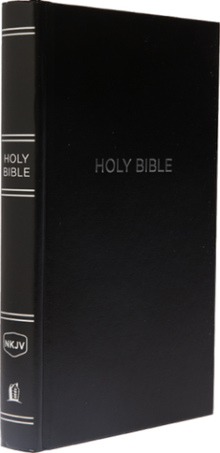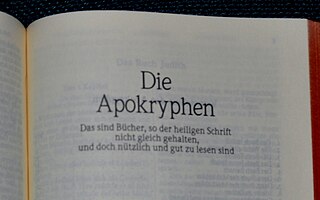
David was, according to the Hebrew Bible, the third king of the United Kingdom of Israel. Historians of the Ancient Near East agree that David probably lived c. 1000 BCE, but little more is known about him as a historical figure.

Isaiah was the 8th-century BC Israelite prophet after whom the Book of Isaiah is named.

Jehoshaphat, according to 1 Kings 22:41, was the son of Asa, and the fourth king of the Kingdom of Judah, in succession to his father. His children included Jehoram, who succeeded him as king. His mother was Azubah. Historically, his name has sometimes been connected with the Valley of Josaphat.

The King James Version (KJV), also the King James Bible (KJB) and the Authorized Version (AV) is an Early Modern English translation of the Christian Bible for the Church of England, which was commissioned in 1604 and published in 1611, by sponsorship of King James VI and I. The 80 books of the King James Version include 39 books of the Old Testament, 14 books of Apocrypha, and the 27 books of the New Testament. Noted for its "majesty of style", the King James Version has been described as one of the most important books in English culture and a driving force in the shaping of the English-speaking world.

Solomon, also called Jedidiah, was a monarch of ancient Israel and the son and successor of King David, according to the Hebrew Bible and the Old Testament. He is described as having been the penultimate ruler of an amalgamated Israel and Judah. The hypothesized dates of Solomon's reign are from 970–931 BCE. After his death, his son and successor Rehoboam would adopt a harsh policy towards the northern tribes, eventually leading to the splitting of the Israelites between the Kingdom of Israel in the north and the Kingdom of Judah in the south. Following the split, his patrilineal descendants ruled over Judah alone.

The Geneva Bible is one of the most historically significant translations of the Bible into English, preceding the King James Version by 51 years. It was the primary Bible of 16th century English Protestantism and was used by William Shakespeare, Oliver Cromwell, John Knox, John Donne and others. It was one of the Bibles taken to America on the Mayflower. The Geneva Bible was used by many English Dissenters, and it was still respected by Oliver Cromwell's soldiers at the time of the English Civil War, in the booklet The Souldiers Pocket Bible.

Caleb, sometimes transliterated as Kaleb, is a figure who appears in the Hebrew Bible as a representative of the Tribe of Judah during the Israelites' journey to the Promised Land.
Partial Bible translations into languages of the English people can be traced back to the late 7th century, including translations into Old and Middle English. More than 100 complete translations into English have been produced. A number of translations have been prepared of parts of the Bible, some deliberately and some projects have been abandoned.

Asa was, according to the Hebrew Bible, the third king of the Kingdom of Judah and the fifth king of the House of David. Based on the Biblical chronology, Biblical scholars suggest that he reigned from the late 10th to early 9th century BCE. He was succeeded by Jehoshaphat, his son. According to Edwin R. Thiele's chronology, when Asa became very ill, he made Jehoshaphat coregent. Asa died two years into the coregency.

The New King James Version (NKJV) is a translation of the Bible in contemporary English. Published by Thomas Nelson, the complete NKJV was released in 1982. With regard to its textual basis, the NKJV relies on a recently published critical edition for the Old Testament, while opting to use the Textus Receptus for the New Testament.

According to the Deuteronomistic history of the Hebrew Bible, a United Monarchy or United Kingdom of Israel existed under the reigns of Saul, David, and Solomon, encompassing the territories of both the later kingdoms of Judah and Israel.
Azubah, עזובה, meaning "deserted", is the name of two women in the Bible:

Jehovah is a Latinization of the Hebrew יְהֹוָהYəhōwā, one vocalization of the Tetragrammaton יהוה (YHWH), the proper name of the God of Israel in the Hebrew Bible/Old Testament. The Tetragrammaton יהוה is considered one of the seven names of God in Judaism and a form of God's name in Christianity.

The biblical apocrypha denotes the collection of apocryphal ancient books thought to have been written some time between 200 BC and AD 400. The Catholic, Eastern Orthodox and Oriental Orthodox churches include some or all of the same texts within the body of their version of the Old Testament, with Catholics terming them deuterocanonical books. Traditional 80-book Protestant Bibles include fourteen books in an intertestamental section between the Old Testament and New Testament called the Apocrypha, deeming these useful for instruction, but non-canonical. To this date, the Apocrypha are "included in the lectionaries of Anglican and Lutheran Churches". Anabaptists use the Luther Bible, which contains the Apocrypha as intertestamental books; Amish wedding ceremonies include "the retelling of the marriage of Tobias and Sarah in the Apocrypha". Moreover, the Revised Common Lectionary, in use by most mainline Protestants including Methodists and Moravians, lists readings from the Apocrypha in the liturgical calendar, although alternate Old Testament scripture lessons are provided.
Isaiah 62 is the sixty-second chapter of the Book of Isaiah in the Hebrew Bible or the Old Testament of the Christian Bible. This book contains the prophecies attributed to the prophet Isaiah, and is one of the Books of the Prophets. Chapters 56-66 are often referred to as Trito-Isaiah. In chapters 60-62, "three magnificent chapters", the prophet "hails the rising sun of Jerusalem’s prosperity".

1 Kings 22 is the 22nd chapter of the First Book of Kings in the Old Testament of the Christian Bible or the first part of Books of Kings in the Hebrew Bible. The book is a compilation of various annals recording the acts of the kings of Israel and Judah by a Deuteronomic compiler in the seventh century BCE, with a supplement added in the sixth century BCE. This chapter belongs to the section comprising 1 Kings 16:15 to 2 Kings 8:29 which documents the period of Omri's dynasty. The focus of this chapter is the reign of king Ahab and Ahaziah in the northern kingdom, as well as of king Jehoshaphat in the southern kingdom.

2 Chronicles 20 is the twentieth chapter of the Second Book of Chronicles the Old Testament in the Christian Bible or of the second part of the Books of Chronicles in the Hebrew Bible. The book is compiled from older sources by an unknown person or group, designated by modern scholars as "the Chronicler", and had the final shape established in late fifth or fourth century BCE. This chapter belongs to the section focusing on the kingdom of Judah until its destruction by the Babylonians under Nebuchadnezzar and the beginning of restoration under Cyrus the Great of Persia. The focus of this chapter is the reign of Jehoshaphat, king of Judah.













